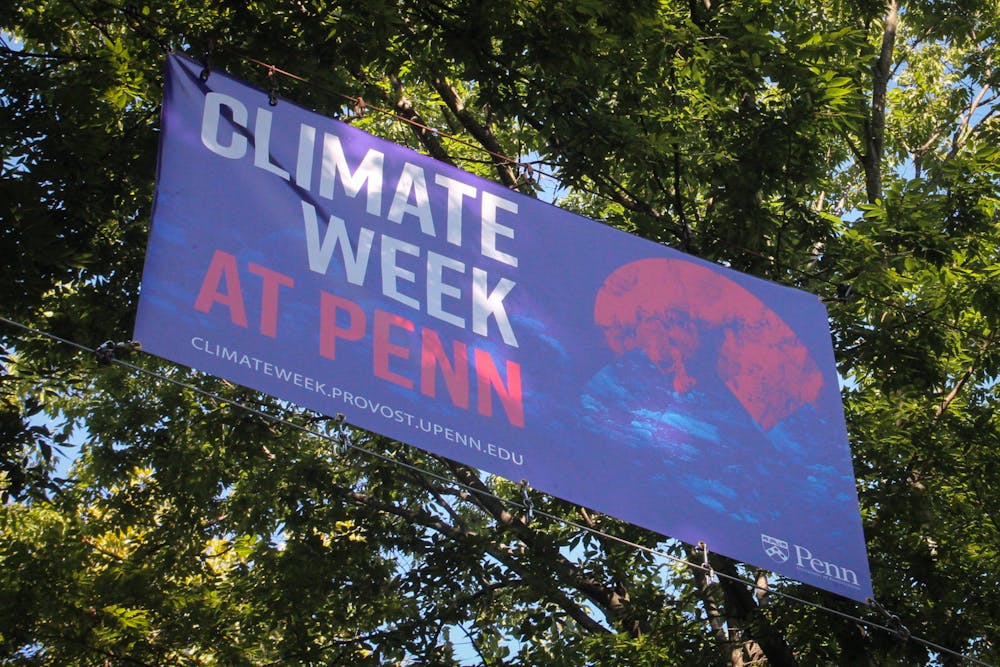Nine Wharton faculty members presented their climate-related research to about 100 attendees at Penn’s Climate Prof event on Wednesday.
The showcase — hosted by Wharton Climate Center co-director Arthur van Benthem — was part of Penn’s Climate Week and was inspired by the “Iron Chef” TV show and Wharton’s “Iron Prof” events. The research presented covered a variety of topics, including climate inequality, greenwashing, green municipal bonds, vehicle emissions, and more.
Associate professor of Legal Studies and Business Ethics and the second Climate Center co-director Sarah Light said that “more and more” professors have been researching environmental issues.
“It's exciting to have a forum where we're showing students that these are the ways in which we're contributing to knowledge about business and climate and the environment,” Light said.
Professor of Finance Luke Taylor, one of the professors who presented, discussed how "green stocks" — stocks from companies with lower carbon footprints — greatly outperformed "brown stocks" over the past decade.
“Green stocks got lucky, in a kind of sick sense,” Taylor said. “They got lucky in the sense that we became much more concerned about climate change over the last 10 years than anyone expected.”
Taylor added that he does not expect green stocks to outperform going forward, but because green firms have lower expected returns, they will also have a lower cost of capital, which should create an incentive for all firms to be greener.
Professor of Accounting Mirko Heinle also presented on green investments and greenwashing. Greenwashing, he said, is a natural outcome of providing incentives, but greenwashing and positive change can still occur at the same time.
RELATED:
Wharton to offer new environmental, social, and governance concentration, major
Penn Program in Environmental Humanities to host storytelling event for Climate Week
“If I want to provide incentives for change, I’m also going to provide incentives to make it look like I changed, but they tend to go hand in hand,” Heinle said.
Light then shared her own findings on greenwashing and its impact on consumer choices. She has observed an increase in the number of claims by firms about their environmental programs, the greenness of their products and operations, and their plans to get to net zero.
“The fact that business firms are taking steps to address climate change independently is great, but we also need to be sure that these claims are made with integrity and that they're factual and accurate." Light said. "Because if they're not, then it presents an inaccurate picture of what is being done to address climate change and other aspects of environmental degradation in ways that affect consumer choices in the marketplace."
Light explained that her research is directed at courts and regulatory agencies to help them implement rules consistent with the First Amendment. One example of this would be requiring publicly traded firms to have factual disclosures about their emissions and other climate-related risks.
College first year Tiffany Li is currently taking Light’s “Environmental Management: Law and Policy” course. After attending the event, she said that she thought it was interesting to see the perspectives of different professors, such as Heinle, on greenwashing.
The Wharton School also recently announced the new Environmental, Social, and Governance Factors for Business concentration and major that students will be able to declare in the 2023-2024 school year.
“Wharton’s really signaling its commitment to bringing ESG into the mainstream of business education and elevating the work around ESG to a school level priority — one of Dean James’ top two priorities going forward,” Vice Dean and Faculty Director of the ESG Initiative Witold Henisz said at the beginning of the event.
Van Benthem added that there are 152 students currently enrolled in the Business, Energy, and Environmental Sustainability major and that this spike in interest has been mirrored on the faculty side through their chosen research topics as well.
Assistant professor of Business Economics and Public Policy Susanna Berkouwer, associate professor of Legal Studies and Business Ethics Brian Berkey, professor of Economics, Finance, and Statistics Frank Diebold, Daniel Garrett — who will become an assistant professor of Finance in January, assistant professor of Economics, Business Economics, and Public Policy R. Jisung Park, and van Benthem, all presented their research during the event as well.
“My hope is that students listen to the research, get more excited about participating in research themselves, working with professors on doing their own research, and have a better understanding of the connections between business, climate, and the environment,” Light said.









